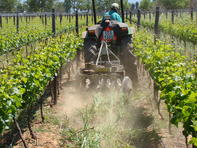The deterioration of the soil quality in South Africa (SA) is a serious threat to South African agriculture. Data from various studies, including Land use and soil organic matter in South Africa indicate that SA soil has low levels of organic matter - about 58% of the soil contains less than 0.5% carbon, and only 4% have more than 2% organic carbon.

Topsoil with less than 2% organic material (OM) is considered “dead soil” as it does not have enough nutrients (carbon) to feed microbes, confirms Bob Cantisano of Organic AG Advisors of California. He advises: ‘soil with less than 2% OM requires fertiliser'.
Organic material includes organic matter, soil microbes (yeasts, fungi, bacteria etc.) and humus. ‘It is a main source of nutrients, microbiological energy and it holds water and nutrients in available form; promote root development, the formation of soil aggregates and increase water infiltration', he adds. Soil fertility is not only aimed at having enough nutrients in the soil for the season concerned, but also to persistently add organic matter to the soil.
This is done by planting green manure, applying crop rotation and composting. The soil must be balanced, and lime, rock phosphate and other organic substances can be used for this. Above all, it is the microbes in the soil - algae, yeast, fungi and earthworms - which determine soil fertility. These microbes are an important part of successful farming.
Important steps to improve soil health:
Use organic material in the soil as it stimulates the growth of bacteria. Soil microbes - effective microbes (EM) can be purchased and added to the soil.
Cultivate soil as little as possible. Too much soil cultivation causes the soil structure to break down and the soil fertility to decrease.
Improve soil coverage - the soil should be covered with as much plant material as possible. This will prevent soil erosion, unnecessarily water evaporating and weed growth. It also contributes to the increased biodiversity of the soil. The soil can be covered with plants or mulch, as discussed below.
Increase plant biodiversity. ‘Bio’ = life and ‘divergence’ = variety. The organic producer must try to have a large variety of living organisms on the production unit or farm. It includes plants, insects and animals, fungi and bacteria. The more living organisms on the farm, the greater the control over the ecosystem.
Translated by Ananda Schoeman